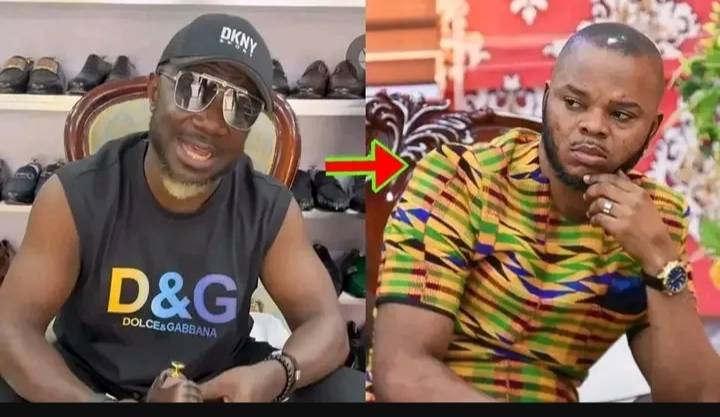In an interview that has taken Ghanaian social media by storm, a well-known fashion icon renowned for his unique style and outspoken personality openly questioned the authenticity of Bishop Obinim, a controversial religious leader. With his signature candor, he described Obinim as “a fake pastor,†fueling a spirited conversation about faith, leadership, and the true calling of spiritual leaders in modern society.
The fashion icon, whose name is synonymous with Ghana’s fashion and cultural landscape, expressed his belief in the importance of sincerity and integrity in religious leadership. When asked about his thoughts on the prominent pastor, he didn’t hold back. “I’ll 100% say Obinim is a fake pastor,†he stated confidently. This remark was followed by a detailed explanation of his perspective, which touched on his personal views on the essential qualities of genuine spiritual leaders and the troubling trends he sees in today’s religious community.
Explaining his views further, he argued that some of Obinim’s claims, particularly those involving his identity as an “angel,†contradicted the role of an authentic spiritual leader. “If you claim you’re not human but an angel, that means you’re here to serve me,†he said, adding, “We’ve been tolerating too much nonsense.†His stance reflected a growing sentiment among some Ghanaians who feel that certain religious figures use exaggerated claims or spectacles to build followings rather than genuinely serving their communities.
The fashion icon backed up his argument by referencing the Bible, quoting Hebrews 5:1, a verse that discusses how genuine pastors are divinely chosen rather than appointed or qualified through academic or formal means. “A pastor doesn’t become authentic simply by going to school,†he explained. “A real pastor is born with the gift.†According to him, the essence of true pastoral calling lies beyond formal education, emphasizing that a true pastor is marked by a sense of divine purpose and compassion for their community, qualities that cannot be taught in a classroom.
Drawing upon historical figures who have impacted humanity positively, he pointed to icons like Bob Marley, Martin Luther King Jr., and Malcolm X as examples of individuals with a genuine calling. “They didn’t carry Bibles, yet they were doing God’s work,†he remarked, highlighting how these figures influenced millions not through formal religious titles but through the authenticity of their actions and the impact of their messages. He argued that such leaders exemplify the qualities of someone genuinely “called†to do meaningful work, whether or not they carry a religious title.
This outspoken take on Obinim sparked reactions from various groups, with some applauding the fashion icon’s courage for voicing an opinion many may hold but are afraid to express publicly. In Ghana and elsewhere, religious leaders are often revered figures, and questioning their authenticity can be seen as highly controversial, especially when they have loyal followers. Supporters of his statements argued that more individuals should feel free to critique leaders who, in their view, stray from genuine spirituality or seek personal gain over communal good.
However, there was also backlash, as Obinim’s followers took offense at the criticism, defending their pastor’s character and mission. For them, Obinim’s actions represent a form of spiritual service, and they believe that his gifts, however unconventional, contribute positively to their faith. Supporters argue that his healing miracles, preaching, and various charitable acts have provided hope and support to many who feel overlooked by traditional institutions. The debate underscored the contrasting views on what it means to be “genuine†in ministry.
In Ghana, where religious beliefs are deeply embedded in the culture, the influence of pastors extends into many aspects of daily life. Pastors, prophets, and other religious figures often serve as life coaches, advisers, and even political influencers. However, as the fashion icon’s comments reveal, there is also a growing awareness about the risks of blindly following any leader without examining their values and actions. For him, true leaders are those who possess a selfless dedication to their mission, who influence others positively without necessarily carrying religious labels.
In the interview, he also touched on what he sees as a need for modern society to focus more on purpose and impact rather than titles. According to him, many who hold titles like “pastor†may lack the genuine calling, while individuals without such titles may make lasting impacts on people’s lives. He urged his audience to consider the legacy and authenticity of leaders they choose to follow, whether in religion or any other domain.
In addition to his criticism of Obinim, he called for a broader conversation on how Ghanaians approach faith. He believes that faith should empower people rather than make them dependent or encourage a culture of sensationalism. His comments have resonated particularly with young people who are seeking leaders they can genuinely trust, those who embody integrity and who are dedicated to community well-being rather than personal fame or financial gain.
The interview has since sparked online discussions across social media platforms, with people sharing their opinions on what they believe constitutes a true pastor and whether the title “pastor†holds the same weight it once did. Some social media users praised the fashion icon’s honesty, seeing his words as part of a larger movement to demand accountability from all leaders, including those in religious spaces.
For the fashion icon, the controversy surrounding his comments serves as a reminder of the power of genuine belief and the responsibility that comes with being a public figure. “We should seek truth, not titles,†he said as he concluded the interview, emphasizing that a life of purpose and integrity speaks louder than any label or claim.
As the debate continues, it remains to be seen how these conversations might impact Ghanaian views on faith, leadership, and the role of spiritual leaders in society. However, one thing is clear: the fashion icon’s bold statements have struck a chord, prompting people to re-evaluate the figures they look up to and the values they hold most dear.


